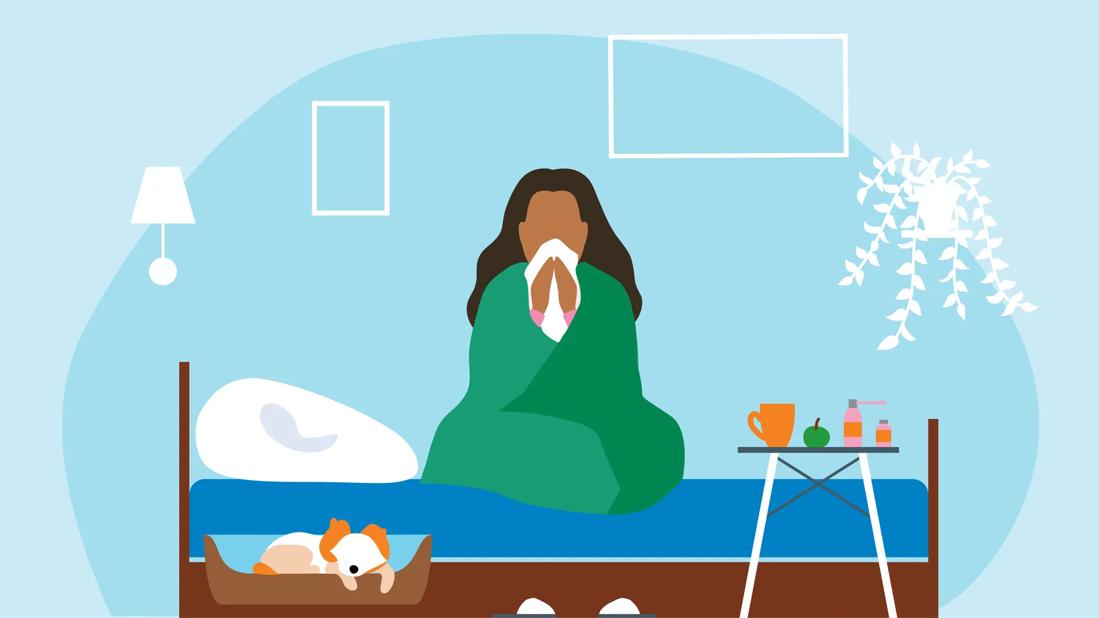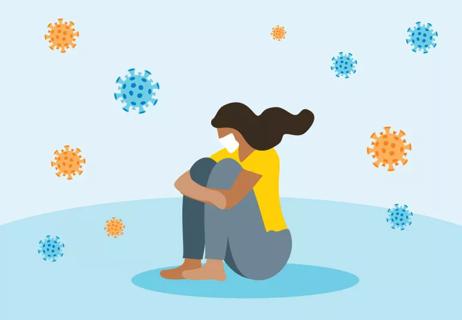You may be spreading the flu virus before your symptoms start and up to a week after

Think of how easily juicy gossip spreads from person to person. In many ways, the flu virus works the same way ― which explains how it manages to infect a billion people a year around the world.
Advertisement
Cleveland Clinic is a non-profit academic medical center. Advertising on our site helps support our mission. We do not endorse non-Cleveland Clinic products or services. Policy
Influenza is a contagious, infectious disease that continually circulates through the global population. The virus keeps moving because of … well, all of us.
The process is simple: We get the flu virus. We share the flu virus. We repeat the process.
But that doesn’t mean that we’re powerless to slow the respiratory illness. Knowing when you start being contagious with the flu and how long you’re contagious allows you to take precautions to not infect others.
For more on flu germs, we turn to infectious disease doctor Sherif Mossad, MD.
“Highly” is the answer to that question. The flu can spread extremely quickly through a large group once the virus arrives on the scene. (Think of your office, for example, or your child’s school.)
People with the flu can spread the ickiness to anyone within 6 feet of them, notes Dr. Mossad. The virus is typically delivered through droplets sent airborne when people cough, sneeze or simply talk.
Sometimes, people can be infected with the flu and share the virus without showing any symptoms of the illness.
If you get the flu, it usually takes two days to start showing the classic symptoms such as a fever, chills, cough and headache. Sometimes, it can take up to four days for symptoms to appear.
Advertisement
You can start spreading the virus during that waiting period.
“You may be contagious with the flu beginning about a day before you feel symptoms ― meaning you can spread it to others before you know you’re sick,” explains Dr. Mossad.
You’ll be most contagious with the flu during the first three or four days after you feel ill. Germs may still be shared for a week after symptoms start, too. (Children and adults with weakened immune systems may be contagious even longer.)
“That’s why keeping your distance from others for several days after you get sick is important,” he adds.
A good rule of thumb is to stay home from work or school until you’ve been fever-free for at least 24 hours without using fever-reducing medications like acetaminophen (Tylenol®) or ibuprofen (Advil®), notes Dr. Mossad.
A fever is defined as:
You should also stay home if you have other severe symptoms, such as a nonstop cough or shortness of breath. (This should be obvious, but if you’re showing signs of being sick, you probably still are.)
Depending on your job or school setting, there may be additional expectations about when to return. When in doubt, use common sense and consider how much you’re around others.
The flu spreads when tiny droplets of virus-laden particles are exchanged between people.
“The main way people infect each other with flu is being in close proximity,” clarifies Dr. Mossad. “An infected person coughs or sneezes and tiny drops of fluids get on your face or hands ― and eventually, those virus-filled particles get in you.”
And once you’re infected, you can start passing the flu to others within about 24 hours to continue the spread.
To avoid the virus and stay healthy during flu season, Dr. Mossad suggests a multipronged approach for protection.
One option many doctors recommend is the flu vaccine, which can reduce the risk of severe illness and hospitalization. It’s worth discussing with your healthcare provider to see if it makes sense for you or your family.
Whether you realize it or not, you probably touch your face an average of 23 times an hour. Now imagine all the potentially germy things you’ve touched since the last time you washed your hands. Ick, right?
Washing your hands is the No. 1 way to keep viruses from elbowing their way into your body and making you sick. There’s a long list of instances when it’s appropriate to wash your hands, but these are particularly important during flu season:
Advertisement
Wash your hands thoroughly for about 20 seconds with soap and water. If you aren’t able to use soap and water, use an alcohol-based hand sanitizer.
Limit your opportunities for being infected by:
And if you don’t feel well, stay away from other people to help them stay healthy.
Even if you take every possible precaution, you may still get the flu. (It is a rather persistent virus.) Call a healthcare provider as soon as possible when symptoms start.
“There are medications your doctor can give you early to help lessen the effects of the flu,” says Dr. Mossad. “But if you wait, chances are you’ll be through the worst of your symptoms and the medication isn’t going to be as helpful at that point.”
Advertisement
Then, make sure to stay home and get some rest while keeping your germs to yourself.
Advertisement

Sign up for our Health Essentials emails for expert guidance on nutrition, fitness, sleep, skin care and more.
Learn more about our editorial process.
Advertisement

They can feel similar, but the differences matter — especially if you’re at higher risk for complications

From washing your hands and disinfecting surfaces to boosting your immune health, there are many ways to reduce your flu risk

The two main strains of the flu have a lot in common, but type A causes more cases and more severe illness than type B

Pasteurized milk is considered safe, but there are concerns about avian influenza spreading through raw, unpasteurized milk

The flu can make kids seriously sick, so watch for signs of dehydration and breathing problems

Tamiflu can shorten your child’s illness and even help prevent the flu

While it typically starts in October, vaccine effectiveness can affect its duration and severity

Influenza puts stress on your body and can lead to serious conditions like pneumonia or stroke

Even small moments of time outdoors can help reduce stress, boost mood and restore a sense of calm

A correct prescription helps your eyes see clearly — but as natural changes occur, you may need stronger or different eyeglasses

Both are medical emergencies, but they are very distinct events with different causes